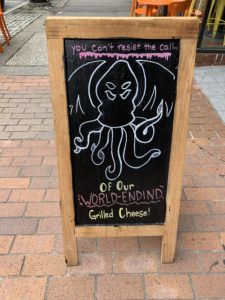Complex feelings about this Christianity Today obituary/profile of Tim Keller, the Presbyterian pastor who defied conventional wisdom by founding a conservative megachurch in Manhattan. Keller died this week of pancreatic cancer at age 72.
In 2004, new to Christianity and Northampton, and looking for community, I became the protégé of an older female writer who started a Bible study group based on Keller’s sermon recordings. She had a sharp sense of humor about everything except the gospel, so my proposal to name ourselves the Kellerettes never caught on. When she wasn’t around, we sometimes spoke of ourselves as the Keller Girls. I thought I was female at the time. In a different life–one where she hadn’t been raised neo-Puritan and clung to it as the only apparent bulwark against emotional chaos–we might have been gender-nonconforming autistic fellow travelers to this day. We valued each other’s frankness and spiritual intensity, up to the very end, when she concluded that “we worship different Gods,” despite using the same language for our faith. I do appreciate someone who can conduct an honest breakup.
Technically, the bloom came off the Keller rose circa 2008 because I was blossoming into some as-yet-unidentified variety of queer. But 2008 was also when I realized I was a child abuse survivor, which suddenly made a lifetime of theological solutions to self-hatred seem terribly beside the point.
CT’s Keller profile begins with a pull quote summarizing his message: “We are more sinful and flawed in ourselves than we ever dared believe, yet at the very same time we are more loved and accepted in Jesus Christ than we ever dared hope.”
I used to take the first statement for granted. In fact I was relieved that the unnameable could be named. So the second half was good news–perhaps the only possible good news, as traditional Christians argued.
However, when I stopped being in daily contact with a mother who blamed me for her unmet childhood needs (while trying to break up my marriage and sabotage my adoption plans), Romans 7:18-25 no longer seemed like an inevitable description of the human condition:
For I know that good itself does not dwell in me, that is, in my sinful nature. For I have the desire to do what is good, but I cannot carry it out. 19 For I do not do the good I want to do, but the evil I do not want to do—this I keep on doing. 20 Now if I do what I do not want to do, it is no longer I who do it, but it is sin living in me that does it.
21 So I find this law at work: Although I want to do good, evil is right there with me. 22 For in my inner being I delight in God’s law; 23 but I see another law at work in me, waging war against the law of my mind and making me a prisoner of the law of sin at work within me. 24 What a wretched man I am! Who will rescue me from this body that is subject to death? 25 Thanks be to God, who delivers me through Jesus Christ our Lord! (NIV)
Life doesn’t have to be a no-win situation. Just remove one psycho.
Similarly, Keller’s core argument spoke to me and many other anxiously high-achieving New Yorkers, but now I want to deconstruct the pessimism that sets you up for the altar call.
At his church in Manhattan, Keller told the nation’s cultural elites that they worshiped false gods.
“We want to feel beautiful. We want to feel loved. We want to feel significant,” he preached in 2009, “and that’s why we’re working so hard and that’s the source of the evil.”
Keller explained to New York magazine that this was, in a way, an old-fashioned message about sin. But when many people hear “sin,” they only think of things like sex, drugs, and maybe stealing. The modern creative class that he was trying to reach, however, was beset by many more pernicious sins jostling to take the place of God’s love in their lives.
The task of “relevance” was to identify the idols that had a hold of people’s souls. And then tell them that they could be free.
The people of Manhattan “had lived their whole lives with parents, music teachers, coaches, professors, and bosses telling them to do better, be better, try harder,” Keller reflected in 2021. “To hear that He Himself had met those demands for righteousness through the life and death of Jesus, and now there was no condemnation left for anyone who trusted in that righteousness—that was an amazingly freeing message.”
When preachers jump to the conclusion “nothing can be done about this, so you need Jesus” they demonstrate a dangerous incuriosity about the psychological sources of our precarious self-worth. Alice Miller’s Prisoners of Childhood (later reissued as The Drama of the Gifted Child) attributes this syndrome, not to idolatry, but to the pain of growing up with a narcissistic parent. Because the child is not seen and loved for himself, but only insofar as he functions as a projection of his parent’s ego and her needs, he starts trying to earn the attachment that should be his by right.
Once I started trauma therapy and faced this dynamic in my past, I didn’t need to re-enact it with Tim Keller’s God.
I used to believe spreading the gospel was the most important thing I could do, because I defined “the gospel” as freedom from obsessive perfectionism and the shame that drives it. Today, same mission, different gospel. A relationship with Jesus can be a stepping-stone to working on your trauma, as it was for me. But don’t let it be a substitute.

